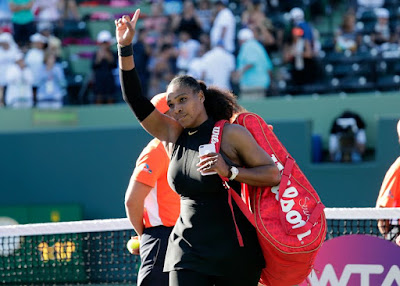Returning to work after maternity leave can be an extremely trying time for mere mortal women (for those who are even lucky enough to get the time off, anyway). But this particular difficulty evidently extends to sports legends and goddesses like Serena Williams as well. After a 13-month break from tennis during her pregnancy and after giving birth to her daughter, Alexis Olympia, this past September, Williams lost in the first round of the Miami Open this week to 20-year-old up-and-comer Naomi Osaka. It was widely noted that it was the record 23-time Grand Slam singles champion’s earliest-ever elimination from the tournament. (The loss also came on the heels of a recent defeat at the BNP Paribas Open—to her sister Venus.)
Williams skipped the usually mandatory post-match press conference and released a statement instead: “Every tournament is an opportunity for me to better understand the areas I need to improve to be my best,” she said. “Naomi played a great match and I learn something each time I play,” the statement continued, “I look forward to continuing my return by progressing every day. I’m so grateful for my fans who continue to support me every step of this incredible journey.” But Williams got a bit more candid on Instagram today, giving a glimpse into the struggle she’s facing to return to tennis after becoming a mother.
It’s a rare, welcome, and validating sentiment for the rest of us to hear: that bouncing back after having a baby actually takes time. Williams’s candor is certainly a departure from the often-blithe tabloid message that celebrities return, flat-abbed and fierce, two weeks after leaving the maternity ward, setting an absurd and impossible standard for normal women everywhere. But if it’s a struggle for Williams, it must really be a struggle—especially, as she revealed to Vogue, that she almost died while giving birth to her daughter, experiencing postpartum blood clots in her lungs.
Williams’s recent experience with the Women’s Tennis Association is also something of a professional returning-to-work lesson. Despite being ranked number one in the world when she left for maternity leave last January—after winning the Australian Open while eight weeks pregnant(!)—according to WTA rules, Williams effectively lost her ranking during her 13-month absence from the sport and is currently ranked 491st. As a result, Williams entered both the BNP Paribas and Miami tournaments unseeded and without a bye (the privilege of skipping the first round) and, in Miami, ended up drawing Osaka, a rising star and newly minted champ. Williams’s case has sparked a passionate debate about how pro tennis treats maternity leave, with some, including former tennis champion and Miami tournament director James Blake, saying that Williams is effectively being punished for having a baby, and arguing her seed should have been protected.
It’s a reminder that returning to a job you don’t recognize, or a job that is newly hostile or discriminating to new mothers, is the unfortunate plight of women across the country—from a lack of pumping rooms and flexible hours to forcing women out of their positions to, for the Serenas of the world, women losing their hard-earned number one status. A recent Cornell study found that there is, indeed, a “motherhood penalty,” with résumés for mothers about half as likely to be called back by prospective employers than those of non-mothers.
In a way, despite how extraordinary she is, Williams is all of us returning from maternity leave—struggling to find a new normal in the face of professional obstacles. But in this, Williams has also become a new kind of champion—one who working moms will be rooting for extra loudly.
